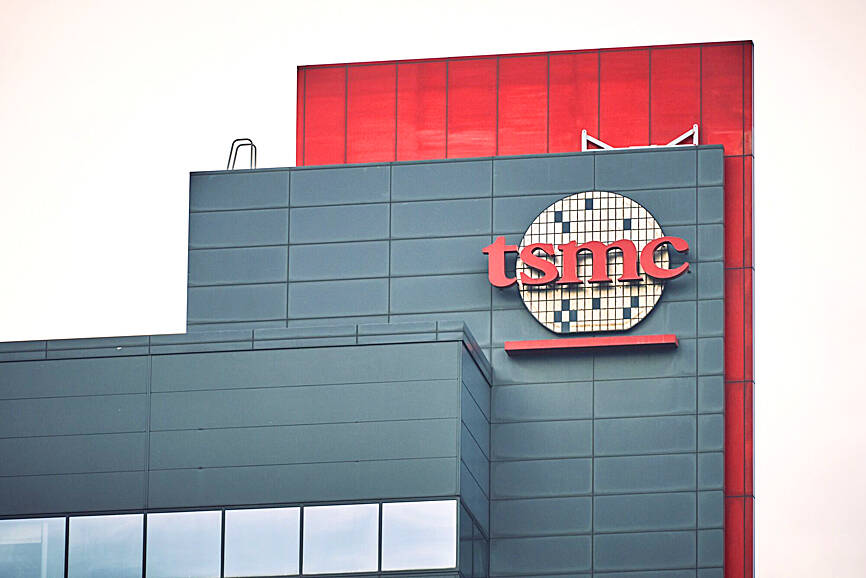Taiwan Semiconductor Manufacturing Co (TSMC, 台積電), yesterday said it has signed an agreement with Innolux Corp (群創) to acquire the flat-panel display maker’s plant in Tainan for NT$17.14 billion (US$530.6 million) amid supply constraints of its advanced packaging capacity constraints.
TSMC plans to use the plant, including buildings and manufacturing facilities, for future operations, the world’s biggest foundry service provider said in a filing with the Taiwan Stock Exchange.
The chipmaker did not elaborate on whether it would convert the plant into a new panel-level packaging factory, or expand its advanced packaging chip-on-wafer-on-substrate (CoWoS) capacity.

Photo: An Rong Xu, Bloomberg
The chipmaker "is working whatever it can" to more than double CoWoS capacity this year and next year in order to solve a severe shortage on strong artificial-intelligence (AI) chip demand, TSMC chairman C.C. Wei (魏哲家) told investors in June.
Innolux shut down the 5.5-generation plant last year after losing its competitive edge in producing cost-effective flat-panel displays.
The company now focuses on rejuvenating its existing facilities and works to diversify into new businesses including chip packaging. Its strategy is to transform itself into a company with two major revenue sources — display and non-display.
The deal with TSMC would allow Taiwan to play a crucial role in the global technology sector and economy, Innolux said yesterday.
Earlier this month, Innolux chairman Jim Hung (洪進揚) told investors that the company expected the asset disposal to bring new business opportunities and form partnerships to enhance its technological capabilities.
Innolux has already built fan-out panel-level packaging (PLP) capacity by converting a less-advanced 3.5-generation plant into one which would provide entry-level chip packaging services for power management chips and radio frequency chips.
The company intends to collaborate with major foundry service providers to advance its chip packaging technology as it looks to pursue opportunities stemming from the AI business, Innolux president James Yang (楊柱祥) said earlier this month.
Innolux expects the new chip packaging business to contribute significant revenue in the first quarter of next year.

TAKING STOCK: A Taiwanese cookware firm in Vietnam urged customers to assess inventory or place orders early so shipments can reach the US while tariffs are paused Taiwanese businesses in Vietnam are exploring alternatives after the White House imposed a 46 percent import duty on Vietnamese goods, following US President Donald Trump’s announcement of “reciprocal” tariffs on the US’ trading partners. Lo Shih-liang (羅世良), chairman of Brico Industry Co (裕茂工業), a Taiwanese company that manufactures cast iron cookware and stove components in Vietnam, said that more than 40 percent of his business was tied to the US market, describing the constant US policy shifts as an emotional roller coaster. “I work during the day and stay up all night watching the news. I’ve been following US news until 3am

Six years ago, LVMH’s billionaire CEO Bernard Arnault and US President Donald Trump cut the blue ribbon on a factory in rural Texas that would make designer handbags for Louis Vuitton, one of the world’s best-known luxury brands. However, since the high-profile opening, the factory has faced a host of problems limiting production, 11 former Louis Vuitton employees said. The site has consistently ranked among the worst-performing for Louis Vuitton globally, “significantly” underperforming other facilities, said three former Louis Vuitton workers and a senior industry source, who cited internal rankings shared with staff. The plant’s problems — which have not

UNCERTAINTY: Innolux activated a stringent supply chain management mechanism, as it did during the COVID-19 pandemic, to ensure optimal inventory levels for customers Flat-panel display makers AUO Corp (友達) and Innolux Corp (群創) yesterday said that about 12 to 20 percent of their display business is at risk of potential US tariffs and that they would relocate production or shipment destinations to mitigate the levies’ effects. US tariffs would have a direct impact of US$200 million on AUO’s revenue, company chairman Paul Peng (彭雙浪) told reporters on the sidelines of the Touch Taiwan trade show in Taipei yesterday. That would make up about 12 percent of the company’s overall revenue. To cope with the tariff uncertainty, AUO plans to allocate its production to manufacturing facilities in

TARIFF CONCERNS: The chipmaker cited global uncertainty from US tariffs and a weakening economic outlook, but said its Singapore expansion remains on track Vanguard International Semiconductor Corp (世界先進), a foundry service provider specializing in producing power management and display driver chips, yesterday withdrew its full-year revenue projection of moderate growth for this year, as escalating US tariff tensions raised uncertainty and concern about a potential economic recession. The Hsinchu-based chipmaker in February said revenues this year would grow mildly from last year based on improving supply chain inventory levels and market demand. At the time, it also anticipated gradual quarter revenue growth. However, the US’ sweeping tariff policy has upended the industry’s supply chains and weakened economic prospects for the world economy, it said. “Now